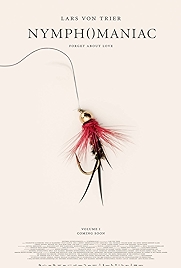A movie for every day of the year – a good one
2 April
Serge Gainsbourg born, 1928
On this day in 1928 Lucien Ginsburg was born, to refugees from the Russian revolution who had fled in 1917. Later, he would change his name from Ginsburg to Gainsbourg to reflect his admiration for the British landscape painter Gainsborough, and from Lucien to Serge to honour his Russian heritage. Originally intending to be a painter, Gainsbourg wound up supporting himself by playing piano in bars and so entered the world of music more by accident than design. However, once he realised he had something of a knack for chansons in the Jacques Brel style, he became a prolific composer and singer, mixing what he called hack work (he wrote two Eurovision songs, one of them a winner in 1965) with experimenta. He became notorious for the 1966 song he wrote for the teenage France Gall, “Les Sucettes” (Lollipops), a song about oral sex, though the singer herself claimed not to realise it. In 1969 he released “Je t’aime… moi non plus” with Jane Birkin (originally recorded with former lover Brigitte Bardot), a song with sexual lyrics, lots of heavy breathing and plenty of quasi-orgasmic groans. It was banned in many countries. Among his other artistic achievements are Histoire de Melody Nelson, an orchestral concept album telling the story of a Lolita-like affair; his Rock Around the Bunker concept album about the Nazis (as a Jew, Gainsbourg had been forced to wear the yellow star as a child); his reggae version of La Marseillaise (which inflamed public opinion until he won the argument by pointing out that the French national anthem is meant to be revolutionary); his co-writing/production on Alain Bashung’s cult album “Play Blessures”. On one of his final albums, Love on the Beat, he sang another controversial song, Lemon Incest, with his daughter Charlotte Gainsbourg, then aged 12.
Nymphomaniac Vol I (2013, dir: Lars Von Trier)
Lars Von Trier’s films are often provocations. In Manderlay he gave us the sight of slaves better off under slavery than as free people. In Antichrist he gave us genital mutilation. In Melancholia we had a Michael Bay style armageddon picture done as psychoanalytical study. With Nymphomania he’s up to his old tricks, the film being the story of Joe (Charlotte Gainsbourg), a nymphomaniac who recounts her life story to the man who has found her beaten up in the street one evening. The form is clearly the Victorian picaresque adventure, with Stellan Skarsgård playing the sort of figure who, in another film, might say “your story intrigues me, please continue”, while Gainsbourg’s Joe recounts lurid incidents from a life of what seems like relentless fucking. Perhaps the style is even older – Pilgrim’s Progress, maybe – because, and here again Von Trier is definitely tickling our expectations, the journey is not about sex at all. It’s about love.
This might come as a bit of disappointment for those hoping to consume hard-core sex under the brown wrapper of European arthouse. But that, again, is a target trope that Von Trier is seeking to invoke – at one point towards the end of Volume 1 of Nymphomania he presents us with a triply split screen, in each third of which some soft-focus guy is banging away at our sexual pilgrim, as clear an echo of early 70s sex-house as you could want (if you want to see it as a religious triptych, that is there too).
The strength of Nymphomania is that it works without any of this referential stuff too, Gainsbourg’s delicate yet defiant performance anchoring it steadily, though Stacy Martin does much of the heavy sexual lifting in Volume 1 as the young Joe. Some of the “guest” performances are truly remarkable – Uma Thurman as a scorned wife confronting her husband and the nymphette Joe is so astonishing that it took me five minutes to realise it was even her; you will forgive Shia LaBeouf for his entire career when you see him as Joe’s peevish earnest lover; Christian Slater is genuinely heartbreaking as Joe’s loving father. It is a remarkable film, which, as great love-making sessions do, pauses playfully here and there for disquisitions – on the Fibonacci sequence, fly-fishing, the music of Bach – before plunging on to the next blowjob or biffing. And yes, you see LaBeouf’s cock.
Why Watch?
- Von Trier’s best film to date
- The remarkable and daring performances
- Part 1 of the last, with Antichrist and Melancholia, of Von Trier’s “trilogy of depression”
- The best Uma Thurman performance you’ll ever see
Nymphomaniac Vol 1 – at Amazon
I am an Amazon affiliate
© Steve Morrissey 2014

